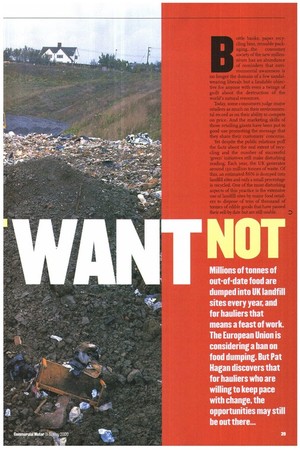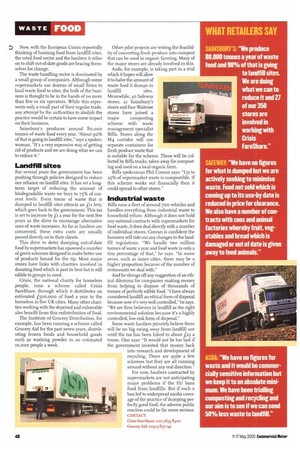ottle banks, paper recycling bins, reusable pack aging. the consumer
Page 41

Page 42

If you've noticed an error in this article please click here to report it so we can fix it.
society of the new millennium has an abundance of reminders that environmental awareness is no longer the domain of a few sandalwearing liberals but a laudable objective for anyone with even a twinge of guilt about the destruction of the world's natural resources.
Today, some consumers judge major retailers as much on their environmental record as on their ability to compete on price. And the marketing skills of those retailing giants have been put to good use promoting the message that they share their customers' concerns.
Yet despite the public relations puff the facts about the real extent of recycling and the number of successful 'green' initiatives still make disturbing reading. Each year, the UK generates around 130 million tonnes of waste. Of this, an estimated 86% is dumped into landfill sites and only a small percentage is recycled. One of the most disturbing aspects of this practice is the extensive use oflandfill sites by major food retailers to dispose of tens of thousand of tonnes of edible goods that have passed
te but are s 0 Now, with the European Union reportedly thinking of banning food from landfill sites, the retail food sector and the hauliers it relies on to shift out-of-date goods are bracing themselves for change.
The waste handling sector is dominated by a small group of companies. Although some supermarkets use dozens of small firms to haul waste food to sites, the bulk of the business is thought to be in the hands of no more than five or six operators. While this represents only a small part of their regular trade, any attempt by the authorities to abolish the practice would be certain to have some impact on their business.
Sainsbury's produces around 8o,000 tonnes of waste food every year. 'About 90% of that is going to landfill sites," says a spokeswoman. "It's a very expensive way of getting rid of products and we are doing what we can to reduce it."
Lanctfin sites
For several years the government has been pushing through policies designed to reduce our reliance on landfill sites. It has set a longterm target of reducing the amount of biodegradable waste we bury to 75% of current levels. Every tonne of waste that is dumped in landfill sites attracts an Li' levy, which goes back to the government. This tax is set to increase by fr a year for the next few years as the drive to encourage alternative uses of waste increases. As far as hauliers are concerned, these extra costs are usually passed directly on to their clients.
This drive to deter dumping out-of-date food by supermarkets has spawned a number of green schemes designed to make better use of products bound for the tip. Most major stores have links with charities involved in donating food which is past its best but is still edible to groups in need Crisis, the national charity for homeless people, runs a scheme called Crisis FareShare, through which it distributes an estimated koo,000 of food a year to the homeless in five UK cities. Many other charities working with the deprived and vulnerable also benefit from this redistribution of food.
The Institute of Grocery Distribution, for example, has been running a scheme called Grocery Aid for the past seven years, distributing frozen foods and household goods such as washing powder to an estimated ro, 000 people a week. Other pilot projects are testing the feasibility of converting fresh produce into compost that can be used in organic fanning. Many of the major stores are already involved in this.
it to halve the amount of waste food it dumps in
landfill sites. Meanwhile, 30 Safeway stores, 21 Sainsbury's stores and four Waitrose stores have joined a
major composting scheme with waste management specialist Biffa. Stores along the M4 corridor will use separate containers for fresh produce waste that is suitable for the scheme. These will be col lected by Biffa trucks, taken away for compost ing and used on a local organic farm.
Biffa spokesman Phil Conran says: "Up to 25% of supermarket waste is compostible. If this scheme works out financially then it could spread to other stores."
Industrial waste Biffa runs a fleet of around 700 vehicles and handles everything from industrial waste to household refuse. Although it does not hold any national contracts with supermarkets for food waste, it does deal directly with a number of individual stores. Conran is confident the business will ride out any changes in the landfill regulations. "We handle two million tonnes of waste a year and food waste is only a tiny percentage of that," he says. "In some areas, such as inner cities, there may be a higher proportion because of the number of restaurants we deal with."
And he shrugs off any suggestion of an ethical dilemma for companies making money from helping to dispose of thousands of tonnes of perfectly edible food. 1 have always considered landfill an ethical form of disposal because now it's very well controlled," he says. "We are firm believers in landfill as the right environmental solution because it's a highly controlled, low-risk form of disposal."
Some waste hauliers privately believe there will be no big swing away from landfill use until the tax has been hiked to about £23 a tonne. One says: "It would not be too bad if the government invested that money back into research and development of recycling. There are quite a few schemes but they are all running around without any real direction."
For now, hauliers contracted by supermarkets are not anticipating major problems if the EU bans food from landfills. But if such a ban led to widespread media coverage of the practice of dumping perfectly good food, the adverse public reaction could be far more serious. CONTACT:
Crisis FareShare: ow 7655 8300 Grocery Aid: 01923857 ro




































































































